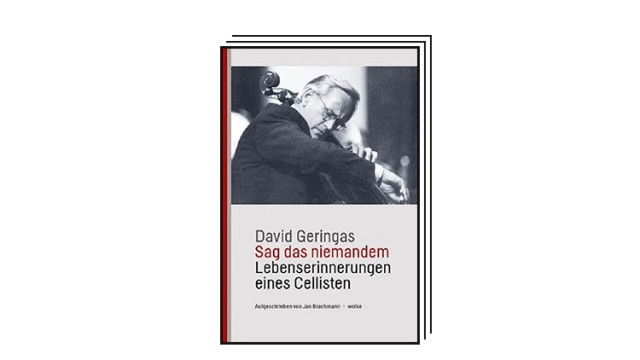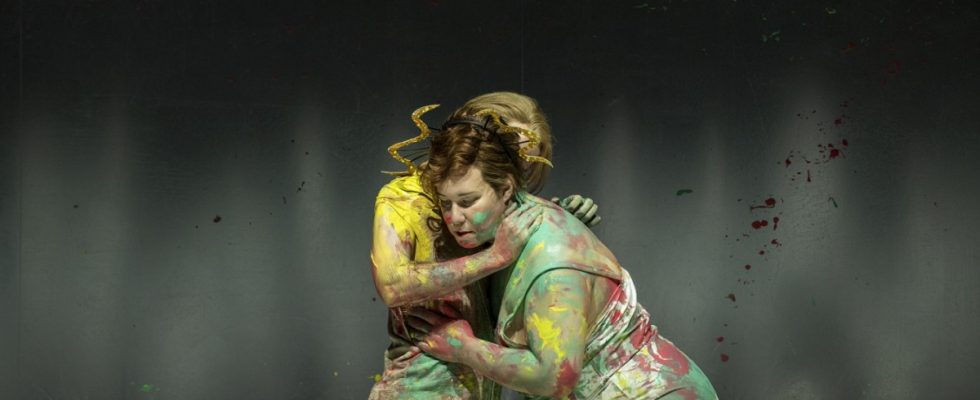Transgender opera: heroic baritone Lucia Lucas in “Lili Elbe”
Baritone player. Hero baritone even. For almost ten years, Lucia Lucas has been a woman equipped with a voluminous, incredibly beautiful, warm, deep baritone, which she can also use crisply and grippingly. One of her favorite roles is Richard Wagner’s Wotan. Lucia has been Lucia since 2014, before that she lived in the wrong body. In a male one. Then, lovingly accompanied by her partner – also an artist – she carried out the sex change. Her body is now that of a woman. The voice remains as it was before. The voice of a heroic baritone.
Normally she sings normal baritone parts on the opera stage, but now for the first time she embodies a character whose story is similar to hers (and which we know from the cinema from the film “The Danish Girl”): the story of Lili Elbe. Lili , initially Einar Wegener, paints landscapes very successfully, his/her wife Gerda also paints. One day Einar steps in as a model for a portrait that his wife is painting, puts on women’s clothes for it – and the feeling of being a woman is amazing in him. Everything that was previously wrong in life seems clear, a shock. Einar becomes Lili, at first Gerda thinks it’s a nonsense, then she understands, lovingly. Lili wants to move on, wants the physical transformation. The historical one Lili died in 1931 in her late 40s as a result of her fourth operation, a uterus transplant. The first operation was successful in 2000.
Now it was the opera “Lili Elbe” premiered at the Theater St. Gallen, the first opera about a trans person, is new even in this genre, which has been gender fluid for more than 400 years. Tobias Picker wrote the music that includes hard expressionism as well as 1920s jazz and much more. Aryeh Lev Stollman wrote the libretto and Lucas worked on it. An evening full of nightmares and hopes, with a fearless, always fascinating Lucia Lucas at the center, an iridescent experience, moving in its truthfulness. Egbert Tholl
Casting show: Ronan Keating as a judge on “The Voice”
Giovanni Zarrella (left) and Ronan Keating.
(Photo: André Kowalski/ProSieben/SAT.1)
The most important sentence for a juror on the casting show “The Voice of Germany” is: “You did a great job.” Criticism is packaged in sensitive niceties and compliments so as not to trample on the sensitive feelings of the candidates, because Dieter Bohlen already does that on “DSDS”. The jury for the current season of “The Voice” includes the friendly Kaulitz brothers, the nice Shirin David and the dream of all mothers-in-law Giovanni Zarrella. Plus, luckily, Irish singer Ronan Keating. This is known from the Schmalz formation Boyzone. But if you think that this means you wash your dishes particularly softly, you are wrong. Keating is as pleasantly austere as the wind at the Cliffs of Moher. Completely incorruptible through sexy performances or the trembling vocal cords of sensitive young singers, he mercilessly sends them home one after the other. “There’s no reason to put people through who aren’t ready,” Keating says. He is right. Christiane Lutz
Film: “Eleonore” with Michel Piccoli and Liv Ullmann on DVD

Eleonore, The Glass Death, directed by Juan Luis Bunuel.
(Photo: Pidax/Pidax)
When the nobleman Richard returns to his castle, his wife Eleonore is dying. Her horse fell on her and her chest was shattered. Richard drags the horse into the stable and kills it. He takes a new young wife and she bears him two sons. Richard cannot forget his beloved dead woman; a devilish stranger brings her back to life. Children are now disappearing in the village, and a girl is burned at the stake as a witch. Then the plague reaches the village. Michel Piccoli as Richard looks like Sean Connery in his “The Name of the Rose” era. Liv Ullmann is the consuming life in a flame-red dress. “Eleonore” (on DVD from Pidax) is a small medieval fantasy by Juan Luis Buñuel, the son of the great Luis, about fertility and the will to survive and the sword of man. With elegiac, playful music by Ennio Morricone, for whom a retrospective has just started at the Munich Film Museum. Fritz Goettler
Musician biography: Memoirs of the great cellist David Geringas

David Geringas, “Don’t tell anyone. Memoirs of a cellist”, wolke Verlag.
(Photo: Cloud/Cloud)
Anyone who believes that musicians’ memoirs are primarily a collection of names of other musicians, lists of pieces, reports of honors and special incidents, plus a bunch of anecdotes, is right. All of this is also presented in detail in this very readable book, the content of which is the great one from Lithuania Cellist David Geringas told the music critic Jan Brachmann. The two then used the Corona years and turned stories and memories into this veritable book. Small inaccuracies in names and printing errors do not spoil the overall impression.
Geringas, born in Vilnius in 1946, tells in an emphatic and comprehensibly oppressive manner about the political upheavals, social constraints and hardships of the Soviet world, in which he lived for almost thirty years, successful as a musician, but oppressed in his other life and always subject to the fearful warning sentence of remembering father: “Don’t tell anyone,” which has become the title of the book. It begins with the death of Stalin, which the then six-year-old perceived differently than the greats did. “After that, four happy days began. All the adults, the parents, the big brothers, the teachers cried as if the end of time had come – but we had no school!” Geringas later talks about the “knockers” who meet the young musician and threaten him with denunciation and want to sound him out. You experience first-hand the constant psychological stress of everyday Soviet life, in which music represents almost the only release.
Of course, the encounter with Mstislav Rostropowitsch, who fundamentally influenced Geringas’ life and play, takes up a lot of space. When the master himself becomes an undesirable and hushed-up person due to his commitment to the ostracized Alexander Solzhenyzin and emigrates to the West, Geringas soon follows him with his wife Tatjana. The second beginning, now in Germany, was also bumpy at first, with disappointments and bitterness. But soon the musical quality and power of this impressively versatile, always curious musician, who has also become one of the important teachers of today’s generation of cellists, triumphantly asserts itself. Harald Eggebrecht
Photography: Ken Narula’s Leica book “Iris & Lens”

Ken Narulas, “Iris & Lens, 50 Leica lenses to collect and photograph”, Steidl Verlag
(Photo: Steidl)
Ken Narula’s two-volume documentary shows that and why some photo lovers have a special passion for the Leica “Iris & Lens” (Steidl Publishing). In it, the collector presents 50 rare (and incredibly expensive) Leica lenses – immersed in a mythical semi-darkness and sickeningly desirable for those infected with the Leica virus. Since Narula is not only a collector but also a photographer, he also shows some photos that he took with these treasures. These are typical Leica images in black and white: soft focus, blurring backgrounds, romantic and as if out of time, emotional, existential. Anyone who has never seen a Leica photo will never dream of another camera brand after reading these beautifully produced volumes. Marc Hoch

